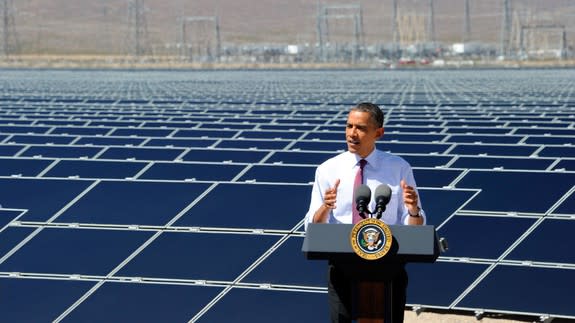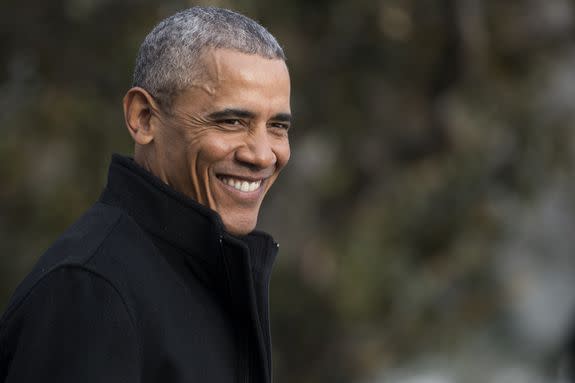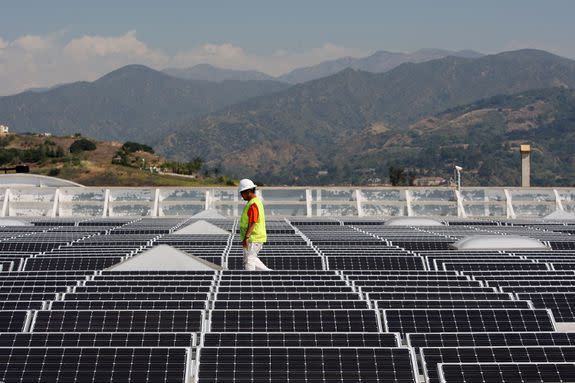Obama says clean energy's momentum is 'irreversible,' even under Trump

Outgoing President Barack Obama sought to assure backers of clean energy that the world will continue to fight global warming — even if the next U.S. president denies that it's happening.
The worldwide shift toward lower-carbon energy is "irreversible" and only gaining steam, Obama said in an article published Monday in the journal Science.
President-elect Donald Trump has falsely claimed that "nobody really knows" if human activity is causing climate change and has vowed to accelerate U.S. production of fossil fuels, a policy that may undermine investments in renewable sources like solar and wind power.
SEE ALSO: A guide to Trump's alarming cabinet full of climate deniers
But Obama, whose last day in office is Jan. 20, said he is "confident" that the trend toward a clean energy economy will persist regardless of near-term U.S. politics.
"No country is better suited to confront the climate challenge and reap the economic benefits of a low carbon future than the United States," Obama wrote in the Science article.

Image: Shawn Thew - Pool/Getty Image
The paper is Obama's latest effort to brandish his academic credentials.
Last week, the president penned a 56-page article for the Harvard Law Review on criminal justice reform and wrote another paper in the New England Journal of Medicine defending his hallmark Affordable Care Act. He also published an assessment of the health care policy in the Journal of the American Medical Association in August.
Obama's Science article is partly a showcase for the climate change policies he helped enact during two administrations, including fuel economy standards for vehicles and federal programs — backed by billions of dollars in Recovery Act funding — to promote wind, solar, energy efficiency and electric vehicles.
But Obama also leans on extensive U.S. and international research to make his case for clean energy's continued growth. He chalks up that progress to four overarching reasons. They are:
CO2 emissions and economic growth are no longer linked
Critics of greenhouse gas regulations have long argued that restricting emissions from power plants, vehicles and factories would in turn restrict economic growth. Increasingly, that is proving not to be the case.

Image: international energy agency (March 2016)
Global carbon emissions from the energy sector held flat in 2014 and 2015 — even as global gross domestic product grew by 3.4 percent and 3.1 percent, respectively, according to preliminary estimates by the International Energy Agency, a Paris-based organization.
That marks a dramatic shift from previous decades, when bouts of global economic weakness forced countries to shutter manufacturing plants or curb electricity use, in turn driving down their overall emissions.
Energy analysts attribute the recent flattening of emissions to widespread investments in energy efficiency and renewable energy, which enable countries to grow their economies without driving up emissions.
Private companies are reducing emissions on their own
For U.S. and global businesses, reducing energy use and investing in renewables isn't just a nice public relations move — it can also boost their bottom lines, Obama wrote.

Image: David McNew/Getty Images
Major industrial firms, such as steel maker Alcoa and auto manufacturer General Motors, are working toward corporate goals to reduce greenhouse gas emissions at their factories. Technology giants like Google and Apple now power nearly all their data centers, offices and direct operations with wind and solar power.
Beyond cutting costs, companies also see clean energy as a significant investment opportunity.
In December, billionaire philanthropist and Microsoft co-founder Bill Gates helped launch a $1 billion fund to invest in breakthrough energy technologies. The fund includes nearly two dozen like-minded investors, including Amazon.com CEO Jeff Bezos and Alibaba founder Jack Ma.
Energy markets now favor renewables and natural gas over coal
Despite Trump's pledge to revive the struggling U.S. coal sector, utility companies and investors are increasingly choosing natural gas and renewable energy over high-carbon coal.

Image: U.S. Energy information administration (March 2016 forecast)
Wind and solar power prices are plummeting as technology improves and projects achieve the "Wal-Mart model" of higher volumes and lower manufacturing and installation costs.
The cost of electricity from wind farms dropped 41 percent between 2008 and 2015 while power from large-scale solar installations fell by 64 percent, the Department of Energy reported.
Meanwhile, cheap natural gas has overtaken coal as the largest source of U.S. electricity generation, making it unlikely that utilities will go back to building coal-fired power plants.
Other countries are joining the clean energy race
Outside the U.S., policymakers and business leaders are competing for a slice of the world's potential clean energy jobs and investment.

Image: AP photo/david keyton
More than 100 countries, including the United States, have also committed to slashing their greenhouse gas emissions under the Paris Climate Agreement, a promise that requires nations to steadily shift their electricity and transportation sectors away from fossil fuels.
"This should not be a partisan issue," Obama said in Science. "It is good business and good economics to lead a technological revolution and define market trends."
